Your Cart
- Title
- Copies
- Price
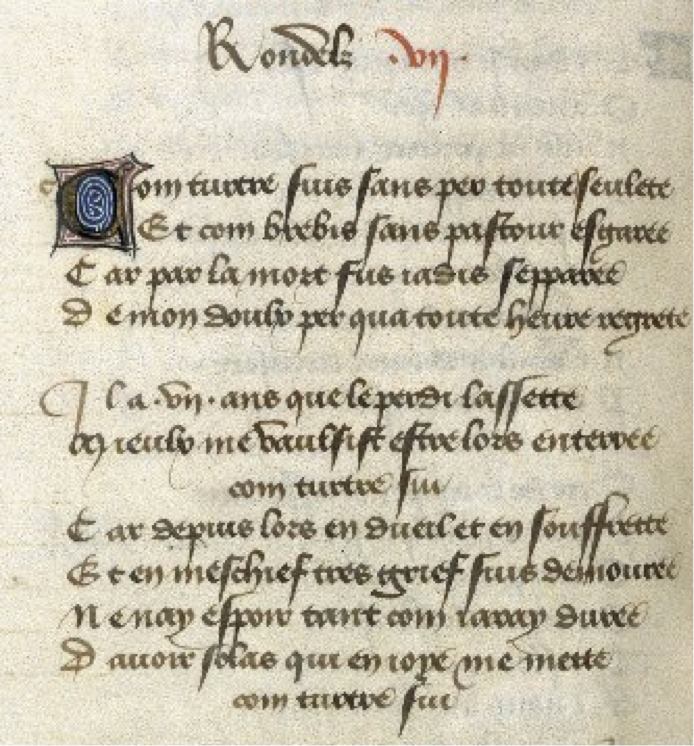
[ The first rondeau as it appears in British Library Harley MS 4431 (fol. 28v.), also known as The Queen's Manuscript and presented in 1414 by Christine de Pizan to Isabeau of Bavaria, queen consort of Charles VI. Christine is believed to have scribed some of the passages. ]
Like a turtle dovewithout her mateam I
— entirelyalone
Lambwithout shepherdwandering afield
Far fromdeathwho severed
My sweetest partall hoursspent longing —
Seven yearsweariedby losing
Better to bewith youburied
Like a turtle doveleft solitaryam I
Disarrayed by mourningleft
Wanting& in grief's meannessI abide
Never hoping —so long as I endure
To have solaceor a place of joy —
As a turtle dovewithout her mateamI
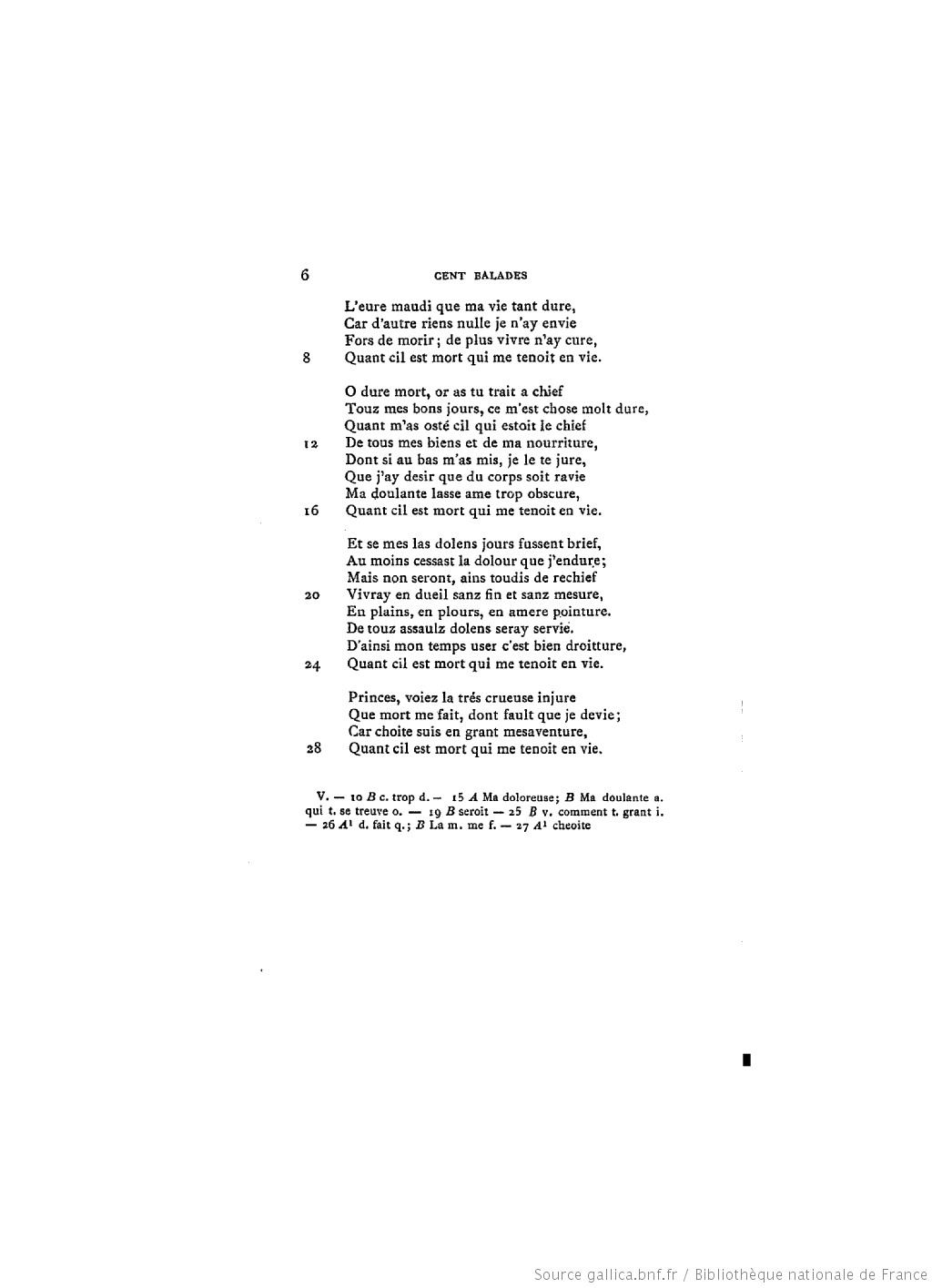
[ Oeuvres poétiques de Christine de Pisan. v. 1, published by Maurice Roy, 1886 BnF, p. 6. ]
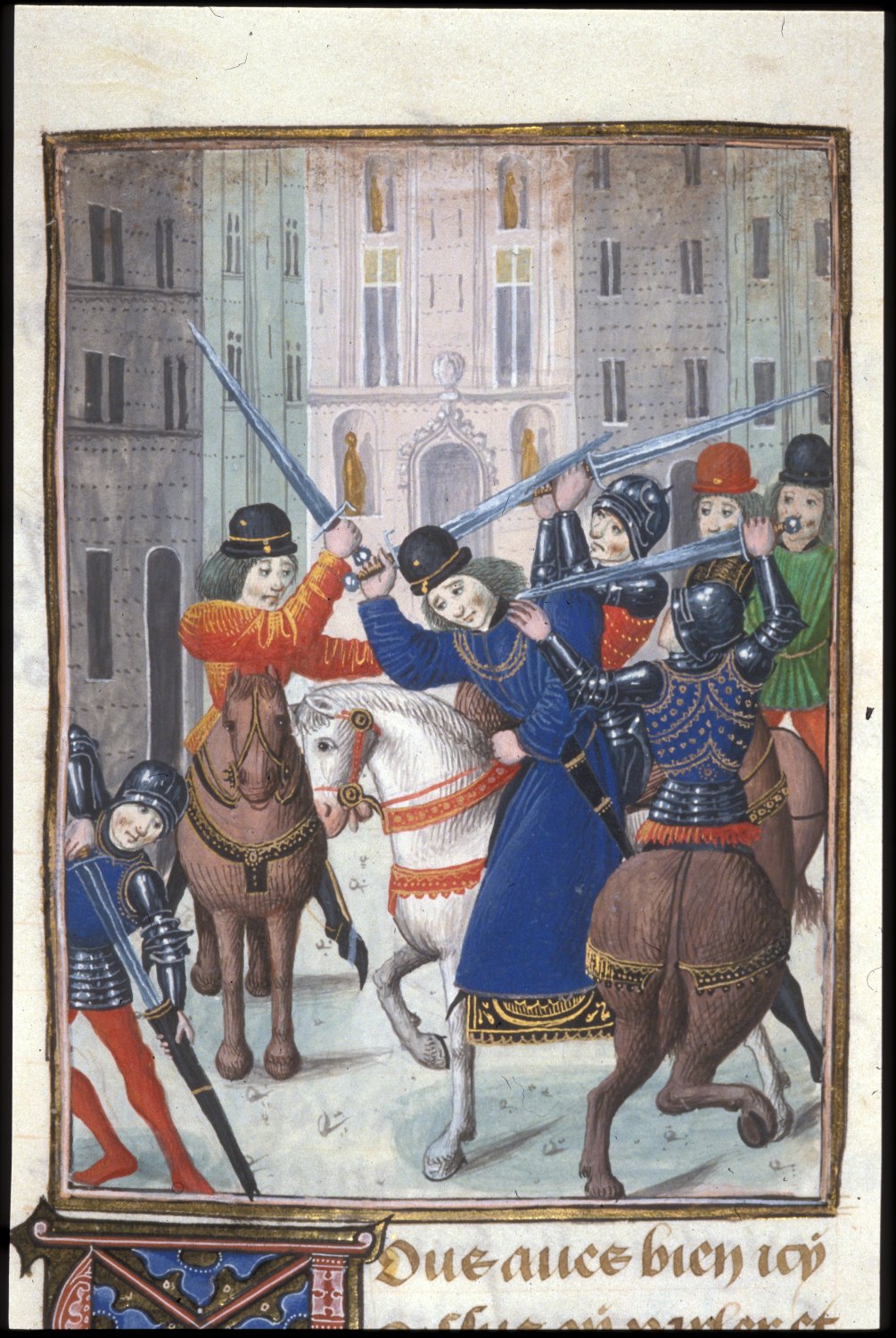
[ Attack on Olivier de Clisson, Constable to King Charles VI and rumored to have disclosed a secret love affair of the Duke of Orléans. From the Harley Froissart. BL Harley 4379 fol. 152v. ]
Ardent burninghe bestowed mea generous purse
My lady
quench me
How could I not?
Six times myselfmy babes' mouths
hungryBy my soul —Rumor claims
He offeredMy ladyone thousandgold
crowns
tumbled&
From his handmy inkblackened
I flame
with desire —Enflamed my pen sent
Secret word to her
My ladycountrywomanfrombeyond
the clouded mountains : :
Duchess
newly wedlately wrongedBy my soul
My lady
Please —
In dreamshe hears the late king’sclocks sound
the hours& the church bells
Rouseherstricken limbs — Awake
before the sun
before her children
Riseshe lifts the latchsteals into
the dark mourning
after the last carousing
Heads toward the water’s edgeau bord du fleuve
dreams she mightslip in —
My mistressinfected by loss
prisoner of griefdeaf to God —
at the lobe of her earneither clock nor bells
norangel's whisper
but the aged tongueof the forever mortal sibyl
Gather nowthe shards
from your father’s treasure
Remember how
your beloveddid teach you this hand —
I vow I willnever forsake you
Wake nowdo not let the green river take you
but write instead
your vision —
The door to all our misfortunes was opened
& Iwho was still very
young entered —
The Book of Fortune's Transformation, 1403
he who knew well how to interpret the Pole Star & how to trim the sails
to keep a straight course
darkened sky cloud thick
crow's nest
disfigure my heart & face
corkscrew caught
whirlwind twistviolent into the sea
he who used to guide the shipnight & day through
all encumbrances & difficulties
I would have thrown myself as Alcyonelost Ceyx
held backmy heart ready
the very air trembledwith shoutsyells
bitter lamentationsdeep sufferings
hewho was such a good pilot
such a loyal loverthere would never be
anothersafe port
grief removed all fear my voice pierced the heavens
consolationdevastatedhopeless ofearthly solace
our desolated shipI could never again navigate
on that seaon the wrong sideof happiness
**
I have sincebeen on land
Fortune took pitybut her helpI do knot know
if it was more of a danger
wearied by long cryingI fell asleep early —
she palpated& took in her handseach bodily part
then departedour shipfollowing the waves of the sea
struck with great forceagainst a rock
I awakened& felt myselftransformed
limbs strongermyself bewildered
fleshstrengthenedmy voice much lowered& my
bodyharder & faster
Hymen's ring fallen from my finger —I found my heartstrong
& boldamazed at this strange adventure
I saw the sail & mast bad weather smashed
the ropes & the topsour ship brokenwater streaming
I set to repair with nails & pitch & strong hammering I
gathered mossamong the rocks& put
into holesuntil watertightI rejoined the broken edges
thus I became a true man (this is no fable)
Fortune taught me this trade
until deathI continue my life
extricated from the rocksmy ship
& set offtoward the placeI started out —
Il me semble qu'il a cent
Que mon ami de moy parti!
Il ara quinze jours par temps,
Il me semble qu'il a cent ans!
Ainsi m'a anuié le temps,
Car depuis lors qu'il departi
Il me semble qu'il a cent ans!
xxix
It seems to me a century
My love has from me parted
Fifteen days by time's measure
Each one seems a hundred years —
Such does my time grow late
Since the time
my love departed
It seems to me one hundred lives
Birdsongbells
the rooster calls&
the moonfoolish from carousing
her pathacross the night
slips into the earth
— • —
Before
the canopied route
a stand of trees
at attention
to sunlight
— • —
Morning grass
oceans the field
apple-sweet
ripening
vermillion
— • —
Swans liftoff the water
&their feathers
cloudthe sky
disappeared
in the rain-frothed river
— • —
Wind through the aspens
each day
a little of their greenflies away
uncovering
globesin the branches
readying
the forestfor sleep
— • —
Days turn
to years
each nightcloser
to her beloved
lit with starsshe can bear it
— • —
Where stone
bridges
the river
no time passesonly a boat
blueflat
over lily roots
— • —
As whenfrom a far distance
you see another&
whetherwalking towards
or away
you cannot tell
Cest anelet que j'ay ou doy
Mon doulz ami le m'a donné.
Souvent nous assemble toudoy
Cest anelet que j'ay ou doy.
Je l'aime bien, faire le doy;
Car pour ma joye est ordené
Cest anelet que j'ay ou doy.
liii
This ring around my finger
My sweetest love placed on me
Everlastingit joins us together
This ring encircling my finger
I love it well — this ring
My joyfulness sealed forever
By this ring circled round my finger
Your hands not on the table resting
but already on the page : inexplicable
yearning adorns us at once. However
else touch is apprehended, one can
listen for the scent of champignons, just
inside a tall oak door. A font of
snow quiets mountains, minerals tincture
saints leafed in gold. They garden shadows
lit by lemons. The sun does not always
announce her arrival, the painter does
not always leave a signature. Your hand
wrote me from a distant corner
how one can hear sixty voices enter a multitude
of cathedral arches. We do
sound every bell over ancient green
assemblages. Pray how we were never
parted, my hand folded always into yours.
Je vois
Jouer.
Au bois
Je vois.
Pour nois
Trouver
Je vois.
My voice
plays hide & seek
In the woods
I search
For us —
Finding
Music I sing
so that I would not grieve
too muchthe lossmy mistress
promisedshe wouldvisit
*
each timemusic plays
I hear her voicesinging
*
& when most desolate
to searchin the spoke of
Fortune's wheel
*
where music is housed
therecompose
the accompaniment
*
larkspurastersnapdragon
all the blueof her robe
woveninto chaplets
*
the windcircles
round usan enclave
of twoardent furious
groundwhirledto air
*
as the knight rides crusades
chainmailacross his chest
&by
his handa sword
*
syncopation
of dances
my mistressplays
*
music heard only
by a familyof daughters
*
she promisesmy voice
will return
one day —
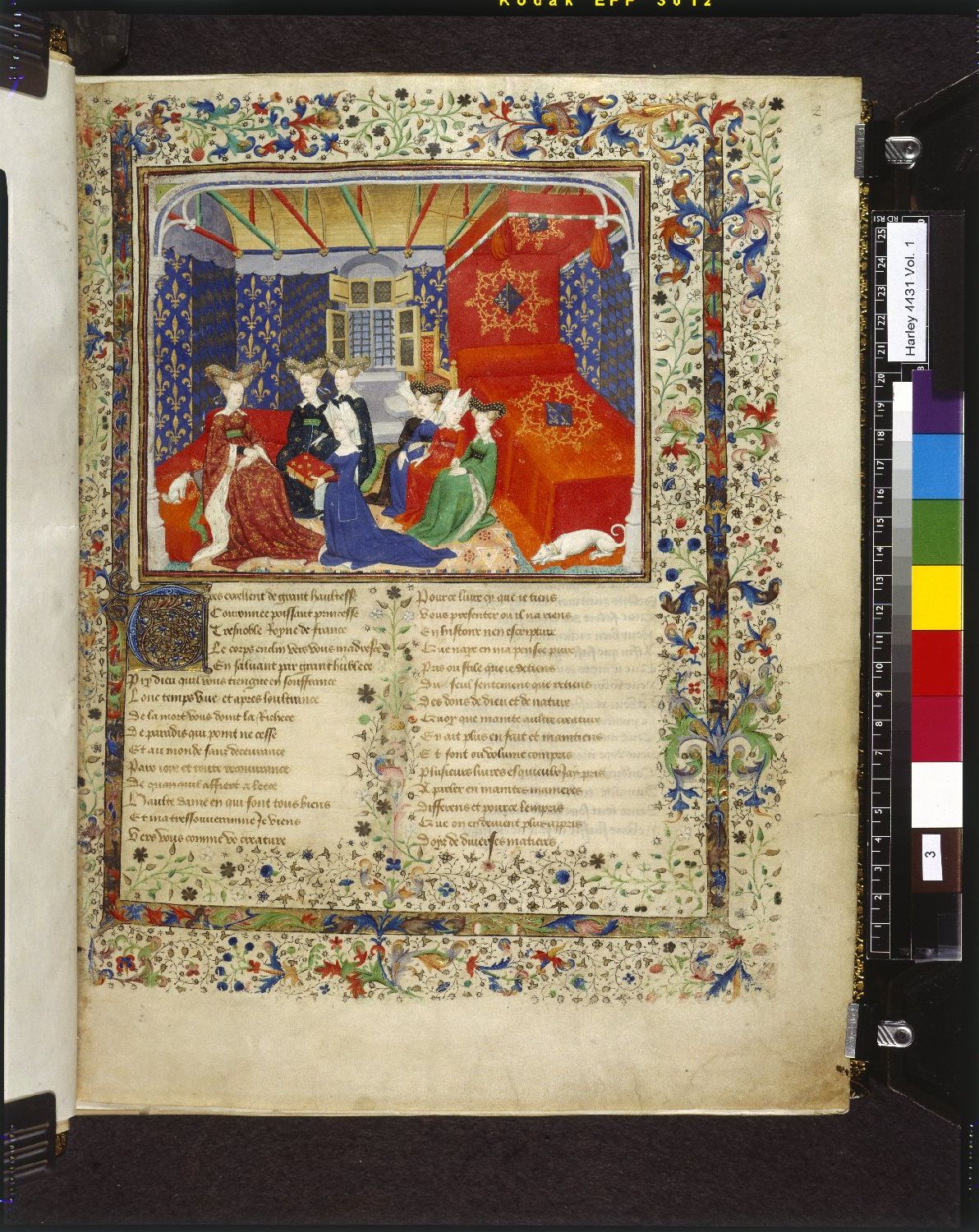
[ Christine presents her book to the Queen, BL Harley MS 4431, fol. 3r. ]
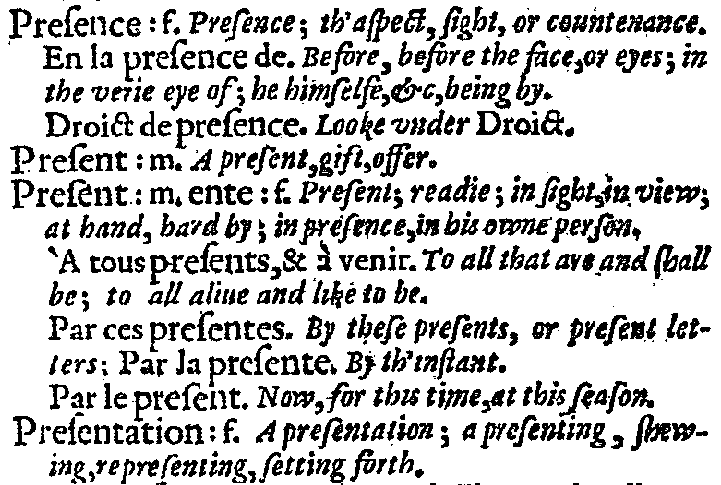
« Before the face, or eyes; A present, gift, offering; To all that have & shall be; to all alive & like to be; A presentation, a presenting, setting forth. »
~
Copied from Randle Cotgrave's
French-English Dictionary, 1611
on this day
of the 21st Century
by a scribe of
Christine
Christine de Pizan comes from elsewhere: first of all, from another language.1
Linguistic hospitality, therefore, is the act of inhabiting the word of the Other paralleled by the act of receiving the word of the Other into one's own home, one's own dwelling.2
1 ] Over six hundred years ago, a young foreign-born widow wrote about struggling to feed her kids, wearing a patched-up coat to do battle with creditors, fending off humiliating remarks and unwelcome sexual innuendoes without disgruntling anyone in power.3 She wrote not in the language of her birth, but in the language of the country she made home.
2 ] One of the first women known to have earned a living through writing, Christine de Pizan was brought to France as a child after her father, a professor at the University of Bologna, entered the court of Charles V as a physician and astrologer. In 1390, Christine's husband died suddenly, leaving her with three children to support, along with a niece and widowed mother. Christine began writing, undertaking a rigorous course of independent study, securing royal patrons, and producing an astonishing body of work in a brief span of approximately 20 years.
For her early lyric poetry, Christine took as her model the poetic formes fixes outlined by Eustache Deschamps in his Art de dictier (The Art of Writing Poetry), a leading authority of the era, along with Guillaume de Machaut, who pioneered the French poetic vernacular.4 At the same time, Christine re-imagined conventional courtly themes—previously engaged with idealized notions of chivalric love—to convey the deeps bonds of a happy marriage and the piercing loss of widowhood.
3 ] In a letter dated February 10, 1404, Christine wrote to Deschamps, twenty years her senior: "Your great reputation has encouraged me, dear master and friend, to send you this. . . . if you would like to see examples of my little understanding in my works, you can order them, without special inquiries for I'm looking for your comments." Deschamps responded with generosity and kind encouragement, likening Christine to one of the nine muses and thanking her "a hundred times" for her letter, "received with great joy."
Their exchange, translated into English by Renate Blumenfeld-Kosinski,5 reminds me of Emily Dickinson's letter to Thomas Wentworth Higginson, written over four hundred years later in another language, another country: "Are you too deeply occupied to say if my verse is alive? The mind is so near itself it cannot see distinctly, and I have none to ask."
Both women, extraordinary in their work, felt alone in their undertaking. And they were. Both wrote themselves into a literary world inhabited by men, and in doing so, expanded that world for others through the newness and possibility of their language.
4 ] Christine often referred to herself as seulette, a woman alone, small and of little consequence in comparison to the male auctours of her time. In a time and place unaccustomed—even hostile—to independent women, Christine undertook to produce manuscripts for royals. That her books are read and studied centuries after their making is its own small miracle. In part, it was achieved through Christine's own brilliance and fortitude. In part, it was the support of those in power who helped her—and the translators who continue to bring her writing into language anew.6
5 ] One day, fortune brought me into the gracious presence of one of those translators, a preeminent scholar of medieval French and Italian literature who answered my most basic of questions as if they were the most critical he had ever heard.
Q. Do you think Christine spoke Italian at home with her mother?
A. Well, hmmm. We can't know for certain, but yes, yes. I imagine she did.
Q. Do you think Christine ever wanted to marry again?
A. Well now, let me think about that some more.
6 ] In learning her craft as a poet, Christine practiced the formes fixes of the ballade and the rondeau. Both make appearances in « widow rounds », with the Middle French versions found in the first volume of Oeuvres poétiques de Christine de Pisan, edited by Maurice Roy and published in 1886.
When I first searched for the Roy volumes, they were missing from the library shelves. But they found me soon enough, as did the codex of a queen.
7 ] Translation, or "translacion" as she calls it, is not a neutral subject for Christine. She will never write in Italian, but her native language exists within her like a source or a potential resource.7
8 ] In learning how to translate Christine, I first looked to the translators and scholars who brought her to me. I looked to dictionaries and chronicles. I glossed, erased, and invented.8 But the poems themselves were conveyed by language that had taken up residence within me, though I had yet to know it.
9 ] In 1418, civil violence and foreign invasion caused Christine to flee Paris. She is believed to have spent the last dozen years of her life in an enclosed abbey, a kind of exile-by-circumstance. With the exception of two manuscripts (one of which is the first poem relaying Joan of Arc's 1429 victory at Orléans), no writing from these years are known to exist, but the more I learned about Christine, the more I began to wonder.
Amid the cadence of wondering, the language dwelling inside emerged as Marina's, a young woman of imagining who serves as scribe for Christine during this historical period of silence.
10 ] Poetry comes to know that things are. But this is not knowledge in the strictest sense; it is, rather, acknowledgment––and that constitutes a sort of unknowing.9
When I first saw Christine's name, French was not a language I knew well. I am learning it still. Marina made translation possible. She refused silence to what is unknown.10 Whether she translated me or I translated her, I cannot say.
11 ] The work of translation might thus be said to carry a double duty: to expropriate oneself as one appropriates the other. We are called to make our language put on the stranger's clothes at the same time as we invite the stranger to step into the fabric of our own speech.11
12 ] The ballade and rondeau of Christine's poetic apprenticeship emerged out of dance and song traditions; as portrayed in The Queen’s Manuscript of 1414, their lyrical music depended not on punctuation cues, but on an understood knowledge of the forms. The question then became: How might I convey this music to the unfamiliar while carrying over a sense of the manuscript original? Maybe more urgently: How might the voice of the woman who composed these poems resonate six hundred years after the keen grief that compelled their making?
To know that things are is not to know what they are, and to know that without what is to know otherness (i.e., the unknown and perhaps unknowable).12
Some say all poetry is translation. Whether this can be known, I cannot say, only that Marina's invention permitted me to enter the music of Christine's voice more deeply, in what Earl Jeffrey Richards recalls as the here and now. What remains constant: To hear a voice that sings across time and space is to understand our own experience as knit to others. Maybe this is one way translation expands the possibility for knowing, the capacity for compassion.
Q. And the woman who called herself seulette?
A. Yes, now that you ask. Yes, I think she married poetry.
Inside the presence of each other's language, we are never alone.
────────────
Christine de Pizan. The Queen's Manuscript. Hosted online by the British Library as Harley MS 4331. Further information available through the collaborative digital project, The Making of the Queen's Manuscript.
Œuvres poétiques de Christine de Pisan. Ed. Maurice Roy. 3 vols. Paris: Librairie de Firmin Didot et Cie: 1884-96. Accessed online through Gallica, the digital library of the Bibliothèque nationale de France.
Cerquiglini, Jacqueline. "The Stranger." The Selected Writings of Christine de Pizan. Trans. Blumenfeld-Kosinski and Kevin Brownlee. New York: W.W. Norton, 1997.
Cotgrave, Randle, A Dictionarie of the French and English Tongues, London: Adam Islip, 1611. Accessed online from facsimile scans made in the French National Library by Greg Lindahl.
Hejinian, Lyn. The Language of Inquiry. Berkeley: University of California Press, 2000.
Margolis, Nadia. An Introduction to Christine de Pizan. Gainesville: University Press of Florida, 2011.
Richards, E. Jeffrey, ed. Christine de Pizan and Medieval French Lyric. Gainsville: University Press of Florida, 1998.
Ricoeur, Paul. On Translation. Trans. Eileen Brennan. Intro. Richard Kearney. London & New York: Routledge, 2006.
Spivak, Gayatri Chakravorty. "The Politics of Translation." Outside in the Teaching Machine. New York: Routledge, 1993.
Marci Vogel is the author of At the Border of Wilshire & Nobody. Her poetry, essays, and translations appear in Jacket2, Plume, Waxwing, Brooklyn Rail, and The Account, among others. The recipient of a Willis Barnstone Translation Prize and Hillary Gravendyk Memorial Scholarship, she is currently a Postdoctoral Teaching Fellow at the University of Southern California.
This originally appeared on July 14, 2017